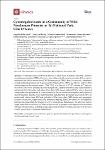Cytomegaloviruses in a Community of Wild Nonhuman Primates in Taï National Park, Côte D’Ivoire
Anoh, Augustin Etile
Murthy, Sripriya
Akoua-Koffi, Chantal
Couacy-Hymann, Emmanuel
Leendertz, Fabian H.
Calvignac-Spencer, Sébastien
Ehlers, Bernhard
Cytomegaloviruses (CMVs) are known to infect many mammals, including a number of nonhuman primates (NHPs). However, most data available arose from studies led on captive individuals and little is known about CMV diversity in wild NHPs. Here, we analyzed a community of wild nonhuman primates (seven species) in Taï National Park (TNP), Côte d’Ivoire, with two PCR systems targeting betaherpesviruses. CMV DNA was detected in 17/87 primates (4/7 species). Six novel CMVs were identified in sooty mangabeys, Campbell’s monkeys and Diana monkeys, respectively. In 3/17 positive individuals (from three NHP species), different CMVs were co-detected. A major part of the glycoprotein B coding sequences of the novel viruses was amplified and sequenced, and phylogenetic analyses were performed that included three previously discovered CMVs of western red colobus from TNP and published CMVs from other NHP species and geographic locations. We find that, despite this locally intensified sampling, NHP CMVs from TNP are completely host-specific, pinpointing the absence or rarity of cross-species transmission. We also show that on longer timescales the evolution of CMVs is characterized by frequent co-divergence with their hosts, although other processes, including lineage duplication and host switching, also have to be invoked to fully explain their evolutionary relationships.
No license information

